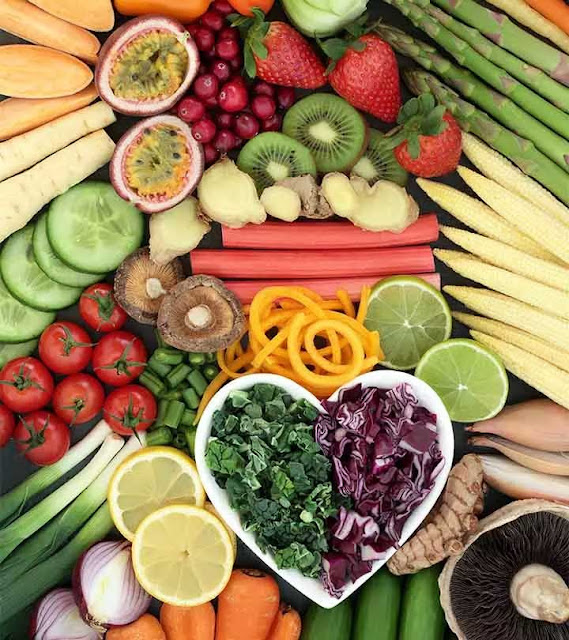This could be the most discussed topic in the field of health – no doubt. Antioxidants fight free radicals and prevent several deadly diseases – they are the Supermen of your system. While some antioxidants are produced within the body, most of them must be obtained from a balanced diet – which is the central theme of this post.
How Are Antioxidants Good For You?
As the name states, antioxidants are any substances that inhibit oxidation and fight potentially damaging oxidizing agents inside a living organism. These oxidizing agents, more commonly called free radicals, are molecules produced when our body breaks down food or is exposed to pollution, toxins, or radiation of any kind.
Antioxidants protect the cells from damage caused by these free radicals. Hence, they are the watchful protectors. They guard our systems, day in and day out. Well, we will get to the details in a bit. But before that, let’s take a glimpse at the different foods rich in antioxidants.
What Are The Foods Rich In Antioxidants?
The antioxidant content in any given food is measured by its ORAC score. Called Oxygen Radical Absorbance Capacity, the ORAC score quantifies the total antioxidant capacity of any particular food item. The higher the score, the more the antioxidant capacity. The following are foods rich in antioxidants, which include a combination of herbs, fruits, vegetables, drinks, and supplements.
Antioxidant-Rich Fruits
· Elderberries (14,697)
· Wild blueberries (9,621)
· Boiled artichoke (9,416)
· Strawberries (5,938)
· Blackberries (5,905)
· Red grapes (1,837)
Antioxidant-Rich Vegetables
· Cooked Russet potato (4,649)
· Green raw kale (1,770)
· Raw broccoli (1,510)
· Raw spinach (1,513)
Antioxidant-Rich Nuts
· Pecans (17,940)
· Brazil nuts (1,419)
Antioxidant-Rich Legumes And Grains
· Red sorghum grain (14,000)
· Kidney beans (8,606)
· Whole grain bread (1,421)
Antioxidant-Rich Herbs
· Cloves (314,446)
· Cinnamon (267,537)
· Oregano (159,277)
· Turmeric (102,700)
· Cumin (76,800)
· Dried parsley (74,359)
· Basil (67,553)
· Ginger (28,811)
· Dark chocolate (20,816)
Antioxidant-Rich Drinks
· Green tea (1,253)
· Red wine (3,607)
And then, there are antioxidant supplements, which include glutathione, quercetin, lutein, vitamin C, vitamin E, resveratrol, selenium, and essential oils (lavender and frankincense).
Including these foods in your diet can amp up your antioxidant intake. Which ultimately makes your life better in various ways.
What Are The Benefits Of Antioxidants?
Known for fighting free radicals and the resultant inflammation, antioxidants boost heart health and improve cognitive function. They also enhance immunity and boost vision, and their anti-inflammatory properties help ward off chronic ailments like arthritis. Adequate intake of antioxidants can also delay aging and improve hair health.
1. Boost Cardiovascular Health
Though not all antioxidants were found to protect against heart disease (this doesn’t mean they would instead cause it), some, like vitamin C, E, selenium, copper, and zinc have powerful cardioprotective activity. It’s been found that adequate vitamin C intake can cut the risk of stroke by as much as 50 percent.
There are hundreds of other studies that state that intake of plant-based diets loaded with fresh fruits and vegetables can protect the heart and prevent cardiovascular issues (1). Fruits and veggies are loaded with antioxidants, and this proves the point.
Did You Know?
Polyunsaturated fats increase the need for more antioxidants. This is because polyunsaturated fats are very sensitive to oxidation and free-radical formation, and thus require a greater amount of protection (and thus intake of antioxidants such as vitamin E, polyphenolics, etc).
2. Improves Cognitive Health
Antioxidants were found to improve memory and cut the risk of dementia. Antioxidant vitamins and minerals such as vitamins C and E, selenium, and zinc have been shown to function as natural “anti-depressants” especially when taken in their most bioavailable, organic forms (e.g. natural vitamin E complex, zinc (glycinate), selenium yeast) – which have greater potency, and provide greater benefit overall than their inorganic variants. Antioxidants also promote improved vascular health – improving microcirculation in the small blood vessels in the brain – thereby enhancing oxygen and nutrient delivery to nutrient hungry neurons (i.e. brain cells).
Antioxidants work as mediators in the central nervous system, thereby preventing inflammation and boosting cognitive health. Most brain diseases are associated with oxidative damage (aka “oxidative stress”), which can be prevented and often improved with a higher intake of antioxidants. These powerful substances also play a role in preventing other ailments like Alzheimer’s disease (2). Greater consumption of carotenoids (another branch of antioxidants) from foods such as sweet potatoes, yams, and carrots was linked to cognitive benefits in adults (3).
3. Aid Arthritis Treatment
One study has found that antioxidant intervention can improve the clinical symptoms of rheumatoid arthritis and offer relief. This can be attributed to the anti-inflammatory properties of antioxidants (4). The Arthritis Foundation also acknowledges the importance of antioxidants. Both the anthocyanins in berries and vitamin C in citrus fruits can combat free radicals that are responsible for arthritis symptoms (5).
4. Can Help Prevent Cancer
Antioxidants prevent free radical damage, which has been found to cause cancer. According to the National Cancer Institute, even dietary antioxidant supplements can aid cancer treatment – given their ability to fight oxidative stress and inflammation (6).
Another study states how total antioxidant status can decline during cancer treatment – which means that antioxidant supplementation can help the treatment process (7).
However, we suggest you take your doctor’s advice in this regard – as some studies also suggest that high levels of antioxidants (e.g. synthetic vitamin E; dl-alpha-tocopheryl) might interfere with one’s recovery and certain treatments (8).
5. Improve Vision
High dose antioxidant vitamins can prevent the progression of and even reverse age-related macular degeneration and other vision issues. Reports by the American Optometric Association state that antioxidant supplements vitamins C and E (natural form; d-alpha-tocopherol) can reduce cataract progression in less than three years (9).
Other important antioxidants for vision health are lutein and zeaxanthin, which also prevent age-related macular degeneration (10). And then, we have vitamin A, which nourishes and protects the retina and other eye structures, and is important in preventing night blindness.
6. Enhance Immunity
Consuming more fruits and vegetables is one sure shot way to boost your immunity (11). Antioxidants like vitamins A, C, E, and carotenoids boost immune health.
One report published in the European Journal of Clinical Nutrition says that dietary antioxidant supplementation protects the immune system and contributes to healthy aging (12). They also help treat other issues related to a weak immunity – like colds and bronchial infections.
7. Might Promote Liver Health
Liver issues usually occur when the organ undergoes severe oxidative stress. And this is where antioxidants come into the picture. They can protect and restore normal liver activity (13).
8. Can Improve Fertility
Studies are limited here. However, one study states that antioxidants such as vitamins C, E, zinc, and selenium can improve sperm quality and fertility (14).
9. Treat Urinary Tract Infection
Studies have shown that urinary tract infection can lead to oxidative stress and depletion of antioxidant enzymes – which is why supplementing with antioxidants can improve the condition (15).
Polyphenols, another class of antioxidants rich in berries and other fruits, are known to fight UTIs. These compounds reduce oxidative stress and inflammation and help bind iron in the urine, preventing it from fueling bacterial growth.
10. Are Good For Kidney Health
Various animal models have shown that antioxidant supplementation can slow down the progression of chronic kidney disease (16). Antioxidants can be particularly beneficial for anyone on dialysis.
11. Can Help Bodybuilders
Antioxidants are known to maximize the training effects of exercise. They also help deal with the oxidative stress of exercise. And since oxidative stress can also contribute to injuries and impair healing, taking antioxidants can aid recovery and even accelerate it. Antioxidants, especially vitamin C, can aid in tissue repair – as exercise is known to cause the formation of free radicals, which can affect muscle tissue and recovery time.
12. Can Benefit Smokers
A number of studies have shown that a healthy intake of a variety of fruits and vegetables can be a protective strategy for smokers (17). Smokers were also observed to have increased oxidative stress and compromised antioxidant activity – which is why taking antioxidants can offer a number of protective benefits.
13. Can Treat Acne
Free radicals travel through the body, stealing electrons from healthy cells. Through this mechanism, they can promote inflammation, which is one of the common drivers for acne and other inflammatory skin conditions (e.g. eczema, dermatitis). As antioxidants neutralize these free radicals, they can help reduce inflammation and prevent and treat acne. They also protect the skin by preventing toxins from penetrating the dermal layer.
Vitamins C and E are two such antioxidants that can fight acne by preventing the resultant inflammation. Vitamin E also promotes skin repair and healing, thereby treating acne scars. Other important antioxidants for preventing and treating acne include selenium and zinc.
14. Delay Aging
It is the free radicals that cause the signs of aging. They cause cell damage and inflammation and lead to wrinkles and age spots. Since antioxidants counter the effects of free radicals, they can play a major role in delaying the signs of aging.
15. Strengthen Hair
Antioxidant supplements can improve hair health and treat nutritional deficiencies that can compromise the health of your hair. And since your hair is regularly exposed to sunlight and pollution, it is constantly being bombarded with free-radicals. Antioxidants can combat this, protecting delicate hair follicles, and prevent hair fall caused by oxidative stress.
These are the various ways antioxidants benefit you. But there arises one important question – how do they work?
How Do Antioxidants Work In Your Body?
How antioxidants work is an important piece of science. If we get into a bit of fundamental, we know that our human body is made of various elements, atoms, and electrons. And two or more atoms form a molecule. A molecule can only be stable if it has the right number of electrons. If it loses an electron when it shouldn’t, it can turn into a free radical. As a free radical, it is highly unstable and can react with other molecules, causing damage to them. It can even cause a chain reaction leading other molecules to turn into free radicals, which can cause havoc in the system.
This is where antioxidants step into the picture. They donate electrons to free radicals, thereby effectively neutralizing them. However, we need a balance between antioxidants and free radicals. When free radicals outnumber antioxidants, it leads to oxidative stress.
Did You Know?
Even free radicals have a role to play in our body. The immune system uses free radicals to kill bacteria, viruses, and fungi that could otherwise infect us.
So, as we said, antioxidants are the warriors. They protect your system. But wait, there’s a catch – an excess of them can be bad.
High dose antioxidant supplementation can interfere with cancer treatment and cardiovascular health (18). It also affects how the body balances the different levels of nutrients and chemicals. Also, not all studies support the positive effects of antioxidants in fighting disease (19).
So, what do we do? Simple. Take your doctor’s (or nutritionist’s) advice.
Conclusion
Taking the right (and the required) amount of antioxidants is key. Focus on getting as many fresh, whole foods rich in antioxidants (and supplements, if needed) as possible on a regular basis – and your body will thank you.
Let us know how this post has helped you. Simply leave a comment below.
References
1. “Genetically high plasma vitamin C…”. US National Library of Medicine.
2. “Fatty acids, antioxidants…”. US National Library of Medicine.
3. “The association of antioxidants and…”. US National Library of Medicine.
4. “Antioxidant intervention in rheumatoid…”. US National Library of Medicine.
5. “The ultimate arthritis diet”. Arthritis Foundation.
6. “Antioxidants and cancer prevention”. National Cancer Institute.
7. “Antioxidants and cancer therapy”. US National Library of Medicine.
8. “Antioxidants may make cancer worse”. Scientific American.
9. “Antioxidants and age-related eye disease”. American Optometric Association.
10. “Antioxidants and vision health…”. US National Library of Medicine.
11. “Super foods for optimal health”. WebMD.
12. “Effects of antioxidants on immune system…”. Nature.
13. “Antioxidants in liver health”. US National Library of Medicine.
14. “Antioxidants and infertility treatment…”. US National Library of Medicine.
15. “The effects of oxidative stress in…”. US National Library of Medicine.
16. “Effects of antioxidants on kidney disease”. US National Library of Medicine.
17. “The interaction of cigarette smoking…”. US National Library of Medicine.
18. “Risk factors for lunch cancer…”. Oxford Academic Journals.
19. “Dietary intake of carotenoids…”. US National Library of Medicine.
Important Notice: This article was originally published at www.stylecraze.com by Ravi Teja Tadimalla where all credits are due. Medically reviewed by Dr. Timothy M. Marshall, Ph.D












